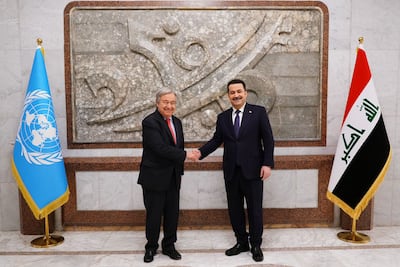All countries with citizens held in Syria's Al Hol camp for suspected ISIS members and their families must do more to repatriate them, UN Secretary General Antonio Guterres said during a visit to Iraq on Thursday.
His remarks came on a tour of Jeddah-I camp outside the northern city of Mosul, where hundreds of Iraqi families have been transferred from Al Hol since May 2021. His trip came only days after the US military said Iraq had repatriated 500 people from Al Hol to Jeddah-I.
His statements echoed Iraq's demands to foreign governments to repatriate their citizens from the camp so that it can be dismantled due to security concerns.

Kurdish officials who administer the camp — in north-eastern Syrian, fewer than 10km from the Iraqi border — also describe it as a security risk and have urged the international community to do more.
Outside Jeddah-I, Mr Guterres said: “From here, I want to send a message to all member states that have nationals in Al Hol and elsewhere. All members states must significantly step up their efforts to facilitate the safe and dignified repatriation of their nationals."
Al Hol houses more than 50,000 people, including Syrians, Iraqis and other citizens who fled ISIS-held areas as the extremists faced an onslaught from the US-backed Syrian Democratic Forces in 2019.
Some of them are family members of suspected ISIS militants, others displaced Syrians and Iraqi refugees. They are either banned from leaving the tented city by the Kurdish forces or have nowhere else to go.
Shamima Begum, who left her east London home to join ISIS in Syria aged 15 and is now held in Al Hol, lost her appeal last week against the UK government's move to strip her citizenship and bar her from returning to Britain.
The largest camp for displaced people left over from the war with ISIS has become one of the most problematic humanitarian issues in the region.
Mr Guterres said nearly half of Al Hol’s population are under the age of 12 and are “deprived of their rights, vulnerable and marginalised — they are trapped in a desperate situation with no end in sight”.
He described it as the “worst camp that exists in today’s world … with the worst possible conditions for people and with enormous suffering for the people that have been stranded there for years".
“So they deserve a path out," he added. "This is a matter of human decency and compassion — and it is a matter of security."
The UN chief, who started his official visit to Iraq on Wednesday, said: "The longer we let this untenable situation fester, the more resentment and despair will grow, and the greater the risks to security and stability.
“We must prevent the legacy of yesterday’s fight from fuelling tomorrow’s conflict.”
Since 2021, Iraq has repatriated hundreds of families from Al Hol to Jeddah-I for rehabilitation before they are reintegrated into society.
Mr Guterres commended the Iraqi government "for its efforts, which are an example for the world".
"I recognise this is an extremely complex, challenging and sensitive issue but I encourage the government to continue working towards the accelerated, community-based reintegration of residents here, most of whom are under the age of 18," he continued.
In mid-2014, ISIS overran large parts of Iraq and Syria, declaring a caliphate in occupied territory.
Backed by a US-led international coalition, Iraq announced victory against ISIS in late 2017 after three years of gruelling fighting that left many of the occupied cities in ruins.
However, the terrorist group's cells continue to mount hit-and-run attacks, particularly in vast desert regions of northern and western Iraq near the border with Syria.


